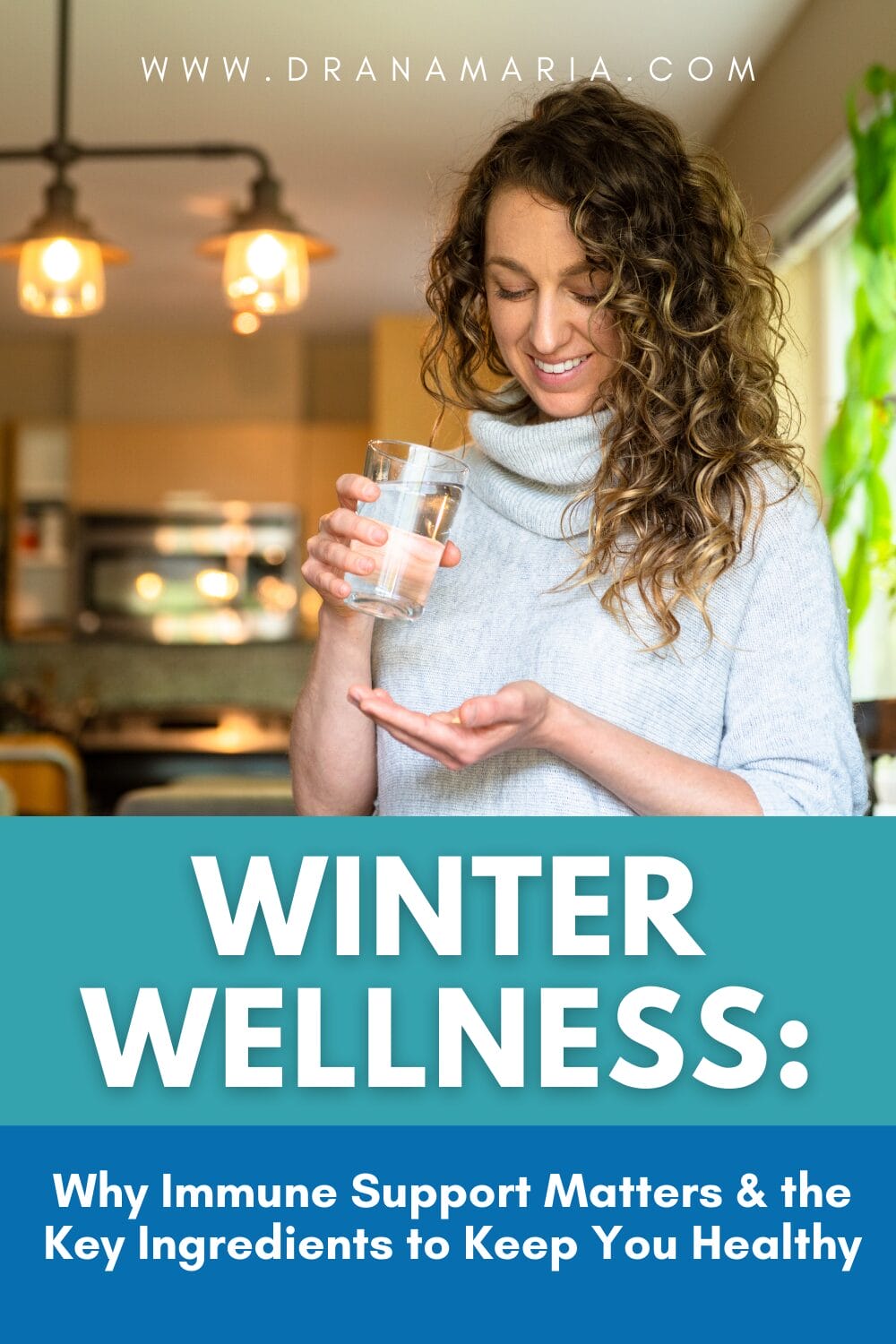Does anyone else have little germ monsters running around your home? It often seems like my kids are having a contest to see which of them can bring home the nastiest ick! They’re sneezing, touching everything, coughing, sharing water bottles … and honestly, their fascination with trash cans?!!! Like I said, ICK!
Winter is the season of cozy sweaters and warming drinks, but it’s also the time when sniffles, colds, and the flu are at their peak. The chilly weather brings people indoors, which allows viruses to spread much easier. And cold, dry air slows the body’s immune function, leaving you more susceptible to illness. That’s why supporting your family’s immune systems during cold winter months is essential to staying healthy and fighting illness.
In this post, we will
- Explore why immune support matters during the colder seasons
- Highlight our favorite go-to vitamins and supplements that keep your defenses up
- And share practical tips to help you thrive all winter long
Let’s dive into winter wellness!

Why is Immune Support Crucial During Winter Months?
More Time Indoors
Winter places unique stress on the body, requiring extra care to maintain optimal immune health. Scientific studies reveal that exposure to sunlight is significantly reduced during winter, leading to a drop in Vitamin D levels for many people. Vitamin D plays a critical role in regulating immune responses and reducing inflammation, and deficiencies have been linked to a higher risk of respiratory infections, including colds and flu. According to research published in The British Medical Journal, individuals with lower Vitamin D levels are 40% more likely to experience respiratory tract infections.
Winter’s close quarters also create an ideal environment for the spread of germs. Viral particles, such as those from the flu virus, are more stable and airborne in low-humidity conditions, which are common during colder months. According to the Centers for Disease Control and Prevention, flu activity peaks between December and February, coinciding with increased time spent indoors due to colder temperatures.
Cold and Dry Air Slows Body’s Immune Function
Additionally, the colder weather itself poses challenges. Research shows that exposure to cold air may constrict blood vessels in the respiratory tract, reducing the efficiency of your body’s immune response. This effect is compounded by a seasonal shift in diet, as people often consume fewer fresh fruits and vegetables in the winter, leading to a potential shortfall in essential vitamins like Vitamin C and Zinc.
Holiday Stress & Travel
Moreover, stressors like holiday travel and disrupted sleep schedules can weaken your immune defenses, making you even more vulnerable to infections. Shared spaces—whether it’s a crowded bus, a bustling shopping mall, or a family gathering—significantly increase the likelihood of coming into contact with viruses and bacteria.
Which Essential Nutrients Strengthen Immunity?
Vitamin C: The Classic Immunity Booster
Vitamin C is arguably the most well-known nutrient for supporting immune health, and for good reason. This water-soluble vitamin plays a critical role in various immune functions, including promoting the production of white blood cells that fight infections. Additionally, Vitamin C acts as a powerful antioxidant, protecting cells from damage caused by free radicals, which are often elevated during illness. Vitamin C is also necessary for the skin’s barrier function, making it a vital first line of defense against pathogens.
Scientific Insight:
- A review in the Nutrients journal highlights that regular Vitamin C supplementation (200 mg or more per day) reduces the duration and severity of colds, particularly in individuals under physical stress, such as athletes.
Zinc: Supporting Immune Cell Function
Zinc is a trace mineral that is essential for the proper functioning and development of immune cells, particularly T-cells. A deficiency in zinc can impair the immune response, increasing susceptibility to infections. Zinc also has antiviral properties and has been shown to inhibit the replication of viruses, including those responsible for the common cold. Zinc is difficult for our bodies to store, and as such, is vital to replenish through diet or supplementation, especially when fighting illness.
Scientific Insight:
- Research published in the Journal of Infectious Diseases found that zinc lozenges, when taken at the onset of cold symptoms, can shorten the duration of illness by up to 33%.
- Zinc is especially effective when combined with other immune-supportive nutrients, such as Vitamin C.
Vitamin D: The Sunshine Vitamin
Vitamin D is a cornerstone of immune health. Exposure to sunlight is our primary source of vitamin D. So, during winter months with more time spent inside, limited sunlight and shorter days lead to widespread deficiencies. Vitamin D deficiency can weaken your immune system, making you more susceptible to colds, flu, and other respiratory infections.
Vitamin D is a key regulator of the immune system. It enhances the pathogen-fighting effects of white blood cells that are critical for fighting infections. Vitamin D also reduces inflammation and helps modulate the immune response, ensuring it doesn’t overreact (autoimmune disease).
Scientific Insight:
- A study published in BMJ Open found that regular Vitamin D supplementation significantly reduced the risk of acute respiratory infections, especially for those who are already deficient.
- Another study in the Journal of Endocrinology and Metabolism showed that Vitamin D supports the activation of T-cells, which play a vital role in the adaptive immune response.
Elderberry: A Natural Remedy
Elderberry (Sambucus nigra) has been used in medicine for centuries and has gained modern recognition for its antiviral properties. Elderberry is rich in anthocyanins, compounds that not only give the berries their deep purple color but also exhibit powerful immune-boosting and anti-inflammatory effects.
Scientific Insight:
- A study published in the Journal of International Medical Research found that elderberry extract reduced the duration of flu symptoms by an average of four days compared to a placebo.
- Elderberry also enhances the body’s production of cytokines, proteins involved in immune signaling.
My Go To Winter Wellness Bundle
We’ve covered why extra immune support is essential during the winter months to help prevent and fight off illness. Now, I’m thrilled to share what I personally use for my own kids—and what I confidently recommend to thousands of patients in my clinic—our Sick Days Bundles, designed for babies and up!
I swear by these bundles for my kids. They’re packed with everything they need to stay healthy—because as much as I love them, I’d rather not share their germs along with their hugs.
Each bundle features the four key immune-boosting nutrients discussed above:
- Vitamin C
- Vitamin D
- Zinc
- Elderberry
All conveniently packaged together for your ease and peace of mind. Developed by me, Dr. Ana Maria Temple, and crafted by Serawise, these bundles are carefully formulated to meet the highest standards. They are:
- Dairy-Free
- Gluten-Free
- Egg-Free
- Soy-Free
- Corn-Free
- Nut-Free
- GMO-Free
So they’re perfect for our food allergy families!
Other Practical Tips to Support Your Immune System:
- Spend 15–20 minutes outdoors without sunscreen daily to increase natural Vitamin D production.
- Intentionally include more in-season fruits and vegetables, and whole food sources of these essential immune boosting nutrients, in your diet.
- Food sources rich in Vitamin C—oranges, strawberries, bell peppers, broccoli
- Food sources rich in Zinc— oysters, red meat, poultry, beans, nuts
- Food sources rich in Vitamin D— fatty fish (salmon, tuna, mackerel, sardines), egg yolks, liver
- Use a humidifier to maintain optimal indoor humidity levels to reduce virus survival rates.
- Practice good hand hygiene, washing with soap and water for at least 20 seconds.
- Stick to a regular bedtime schedule, and avoid caffeine and sugar, to get enough sleep.
- Move your body and stay active.
References:
https://www.bmj.com/content/356/bmj.i6583
https://news.yale.edu/2015/01/05/cold-virus-replicates-better-cooler-temperatures
https://journals.asm.org/doi/10.1128/jvi.03544-13
https://www.cdc.gov/flu/about/season.html
https://pmc.ncbi.nlm.nih.gov/articles/PMC5707683/
https://pmc.ncbi.nlm.nih.gov/articles/PMC4848651/




